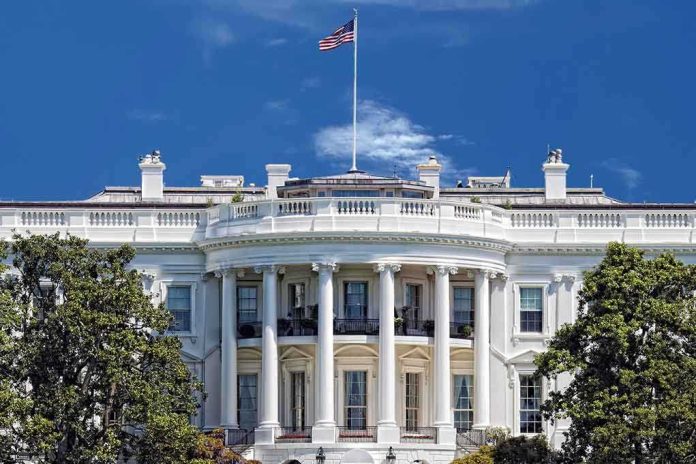
In a striking display of modern political warfare, White House Press Secretary Karoline Leavitt turned a simple query into a viral sensation with just three words.
Story Snapshot
- Leavitt’s quick-witted retort exemplifies meme culture in politics.
- The incident underscores ongoing tensions between the Trump administration and the media.
- Leavitt’s response reflects a broader strategy of dismissing critical media as partisan.
- The confrontation raises questions about professionalism in government-media relations.
The Exchange That Sparked a Media Storm
On October 16, 2025, HuffPost reporter S.V. Dáte questioned the optics of President Trump’s meeting with Vladimir Putin in Budapest. The query wasn’t just about the meeting but touched on the symbolic weight of the location, historically linked to the 1994 Budapest Memorandum where Russia vowed not to invade Ukraine. Leavitt’s response, “Your mom did,” when asked who suggested the meeting location, instantly became a flashpoint for media and public discourse.
Karoline Leavitt Drops Smug Reporter in Three Words After He Bombards Her With Dem Talking Points https://t.co/7qM57NsBwq
— Rita_S (@senorita_LLB) October 21, 2025
Leavitt’s choice of words reflects a growing trend where meme-like retorts are employed by public officials to communicate directly with a media-savvy audience. This approach not only resonates with the administration’s base but also draws widespread attention, reinforcing the administration’s narrative of challenging a perceived biased media.
Historical Context and Tensions
The Trump administration’s relationship with the media has been tumultuous, characterized by a strategy that often involves direct confrontation. The Budapest meeting with Putin added another layer to the already complex U.S.-Russia relations, drawing scrutiny from media outlets, particularly those viewed as left-leaning. Dáte’s inquiry was rooted in this context, aiming to probe the implications of the meeting’s location. Leavitt’s retort and subsequent sharing of the exchange on social media showcase a deliberate tactic to bypass traditional media channels and engage the public directly.
The administration’s use of social media and meme culture reflects a broader shift in political communication, where traditional norms of decorum are often sidelined for more impactful, albeit controversial, engagement strategies.
Stakeholders in the Spotlight
Key figures in this narrative include Karoline Leavitt, tasked with defending the administration’s actions and messaging, and S.V. Dáte, a veteran journalist seeking accountability and transparency. The power dynamics are apparent; Leavitt controls the narrative through her position, while Dáte operates within the constraints of access and framing by those in power. The broader media ecosystem, including outlets like HuffPost, plays a crucial role in shaping public discourse through reporting and analysis.
For Leavitt and the administration, the goal is to energize their base by positioning themselves against what they perceive as partisan media. For Dáte and similar journalists, the objective is to hold the administration accountable by probing decisions and highlighting historical and contextual nuances.
Implications and Industry Reflections
This incident has immediate and lasting implications. In the short term, it intensifies political polarization and energizes Trump supporters, while further eroding trust between the administration and mainstream media. Long-term effects include the normalization of confrontational and meme-driven communications, potentially undermining the professionalism expected in government-media interactions.
Experts argue this trend could have a chilling effect on press freedom, reinforcing echo chambers and selective media consumption. The use of mocking language in official contexts raises concerns about the erosion of accountability and transparency in government communications. While some defend Leavitt’s approach as a necessary pushback against perceived media bias, others criticize it as detrimental to the norms of professional discourse.




